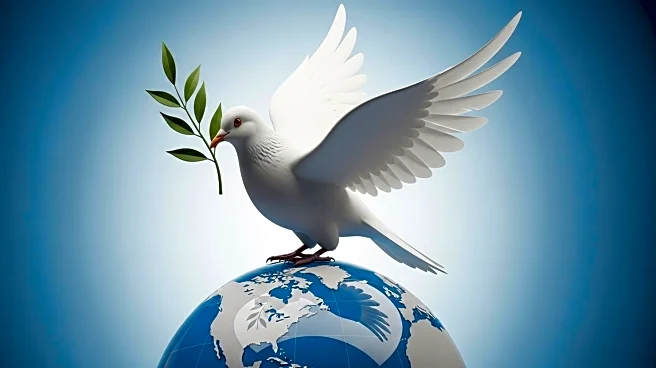What's Happening?
Russian President Vladimir Putin praised President Trump for his peace efforts, despite Trump not winning the Nobel Peace Prize. Putin highlighted Trump's initiatives towards achieving ceasefires in Gaza and Ukraine, describing them as significant contributions to resolving long-standing global crises. The Russian leader expressed hope for extending the New START nuclear arms reduction treaty with the U.S., emphasizing the importance of maintaining strategic arms control agreements. Putin's comments came during a summit in Tajikistan, where he also criticized the Nobel Committee for awarding the prize to individuals who have not significantly contributed to global peace.
Why It's Important?
Putin's praise for President Trump underscores the complex dynamics of international diplomacy, particularly in the context of U.S.-Russia relations. The acknowledgment of Trump's peace efforts may influence perceptions of his foreign policy legacy, potentially impacting future diplomatic engagements between the two nations. The discussion around the New START treaty highlights the critical importance of arms control agreements in maintaining global security and stability. The failure to extend such treaties could lead to increased tensions and an arms race, affecting international peace efforts. Putin's criticism of the Nobel Committee also raises questions about the criteria for awarding the prize and its impact on global peace initiatives.
What's Next?
The potential extension of the New START treaty remains a key focus for both Russia and the U.S., with negotiations expected to continue. The outcome of these discussions will significantly impact global arms control efforts and the strategic balance between the two nuclear powers. President Trump's response to Putin's praise may influence future diplomatic interactions and negotiations, particularly concerning ongoing conflicts in Gaza and Ukraine. The international community will likely monitor these developments closely, as they have far-reaching implications for global security and peace.
Beyond the Headlines
Putin's comments highlight the broader implications of international recognition and awards in shaping diplomatic narratives and influencing global perceptions. The focus on peace efforts underscores the importance of prioritizing diplomatic solutions in resolving complex geopolitical conflicts. The discussion around the Nobel Prize criteria may prompt a reevaluation of how global achievements in peace are recognized and celebrated, potentially influencing future awards and their impact on international relations.









